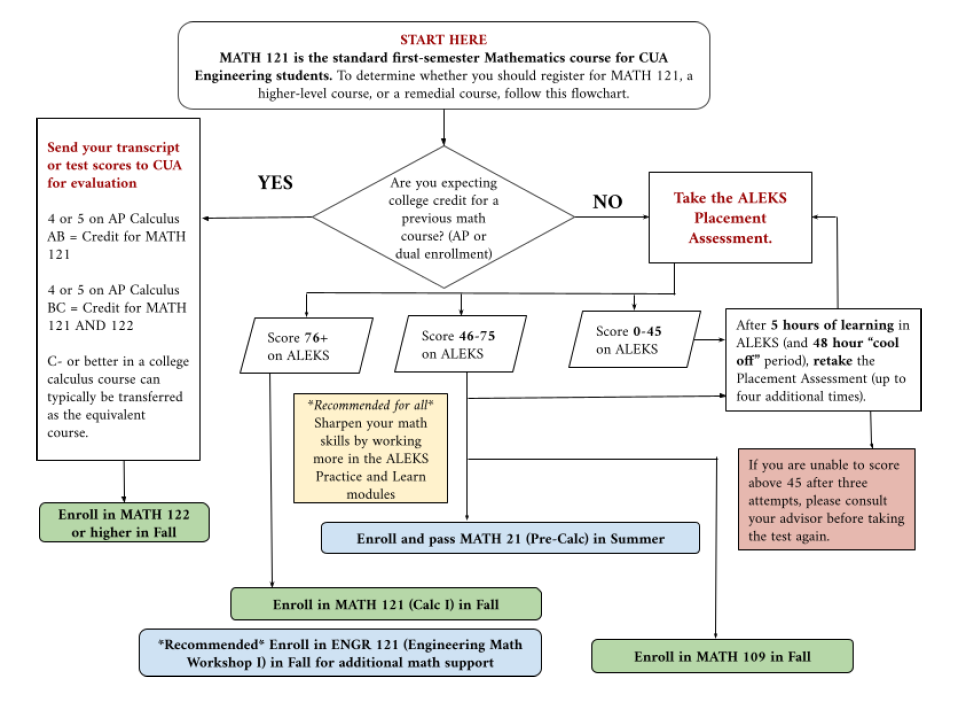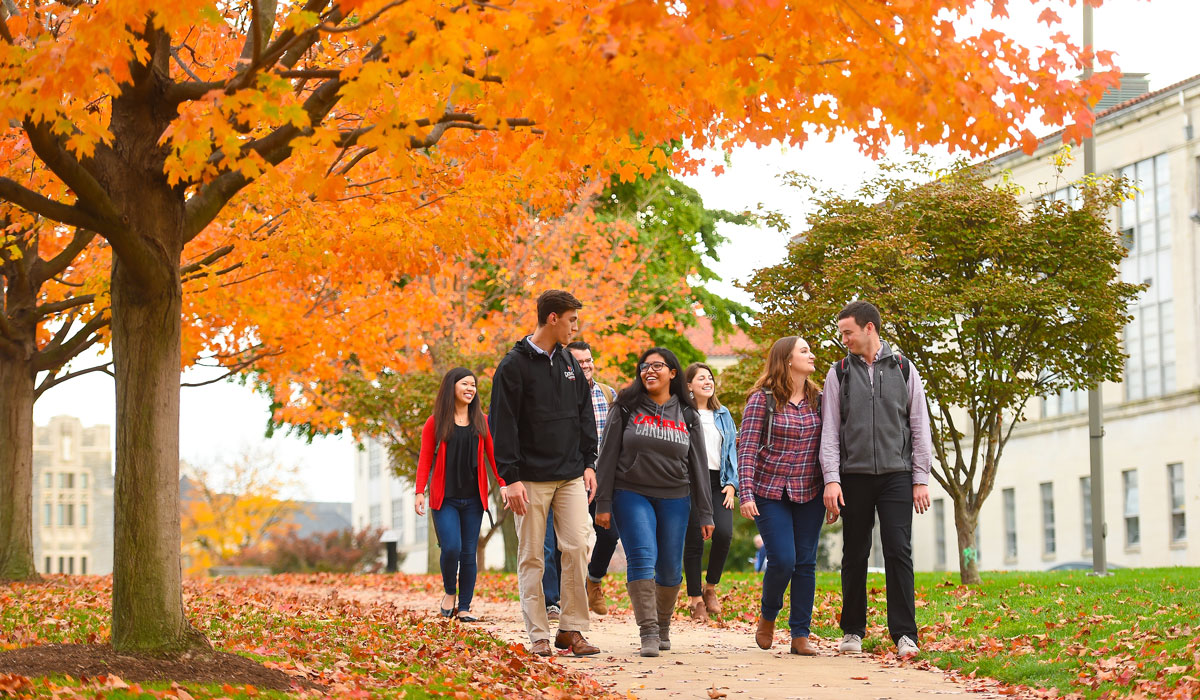Congratulations on your acceptance to The Catholic University of America! To help you prepare, we compiled the following key academic information.
Your Advisor
This summer, your Academic Department Chair will serve as your faculty advisor, assisting with your course registration and general transition into the University. By September, you will be assigned a permanent Faculty Advisor in your academic area who will be a mentor and advisor for the next four years. Your Faculty Advisor can help you understand the nuances of your curricular path, guide you towards exciting opportunities for research and internships, and help you think creatively about your future.
Your Classes
Your first college courses will launch you towards graduation. You will be automatically registered for these courses:
-
The Classical Mind (PHIL 201)
In the fall, you will be introduced to some of the greatest thinkers in history and how they tackled questions that still resonate today. In the spring, you will continue by studying modern thinkers and their answers to these questions.
- Required? Yes. (Honors Students should see below.*)
- Options? No. You will be enrolled in this course automatically. It will be on Monday/Wednesday/Friday at 9:00am or 10:00am.
This is one of your two Learning Community courses that form the First-Year Experience. With roughly twenty other students, you will have a shared, year-long learning experience in the liberal arts.
Course Description: An introduction to philosophy, using the original writings of several philosophers from the ancient and medieval periods, with a more general consideration of the history of philosophy. Enduring Questions addressed: (1) What does it mean to be human? What is our place in nature and in the cosmos? (2) What makes a life good? How can we live a good life or best pursue it? What is opposed to it? See more philosophy course descriptions here.
*Honors Students only: You will be automatically enrolled in HSPH 101. -
English (ENG 101) or Theology (TRS 201)
ENG 101: Writing and Rhetoric OR TRS 201:Foundations of Theology I: Scripture and Jesus Christ
You will complete ENG 101 in the Fall and TRS 201 in the Spring, or vice versa. By the end of your first-year, you will have completed both.- Required? Yes. (Honors Students should see below.*)
- Options? No. You will be enrolled in this course automatically. It will be on Monday/Wednesday/Friday at 9:00am or 10:00am.
This is one of your two Learning Community courses that form the First-Year Experience. With roughly twenty other students, you will have a shared, year-long learning experience in the liberal arts.
ENG 101 Course Description: Through intensive writing practice, students in English 101 inductively explore the Western traditions of logic and rhetoric, developing their facility and effectiveness as writers and deepening their awareness of the rhetorical aspects of human communication. The course teaches students to write well-organized, logically sound, rhetorically effective, and grammatically correct expository and argumentative prose. Because this is a course in the skills and processes of writing, students will be writing constantly - numerous essays, in-class drafts and other assignments - in addition to being quizzed regularly on grammar and mechanics. The course also introduces students to the library, to tools for finding information, and to research techniques, including the conventions and principles of documentation and the art of analysis and synthesis of sources. See more English course descriptions here.
TRS 201 Course Description: The course develops an understanding of and engagement with revelation, as understood in Vatican II's Dei Verbum, through scripture and the historical unfolding of the tradition, that centers on and draws its rationale from the person and work of Jesus Christ. See more Theology and Religious Study course descriptions here.
*Honors Students only: You will be automatically enrolled in ENG 101H OR HSTR 101.
Choosing Other Classes
See advisor recommendations for your major.
Your Academic Checklist
Further details on the academic checklist items below can be found on the CACS Class Registration Checklist page.
-
Meet Your Advisor
- Required? Yes.
- Meet with your department chair/faculty advisor.
- Receive approval for registration (see “Register for Classes” below)
You will automatically be assigned a department chair/faculty advisor. Once this occurs, you will receive a welcome email from your advisor with next steps about meeting. Keep an eye out in your University email for this!
-
Complete Math Placement Test
Incoming engineering and computer science students should take the ALEKS Placement Assessment (using their Cardinal Credentials) to determine if they are ready to take MATH 121, Calculus I (students with AP credit for Calculus I do not need to take the test). See the document “Important Information about Mathematics for Engineering Students” for more information about math placement and preparation options. If prompted to enter a class code, enter PTEW6-AXFR6.
ALEKS PPL is a web-based program that uses artificial intelligence to map a student’s strengths and weaknesses. The Placement Assessment is up to 30 questions and generally takes 60-90 minutes to complete. After an initial Placement Assessment, an individualized Prep and Learning Module is available for students to refresh their knowledge on forgotten topics Students then have the opportunity to reassess and improve their placement after the baseline assessment four additional times. Please review this information as soon as possible and don’t hesitate to contact us with any questions.

-
Register for Disability Accommodations (if needed)
- Required? No. Students requiring accommodations should register.
- Register here with Disability Support Services
-
Transfer & Test Credits (AP/IB/Dual Enrollment)
- Required? Possibly. If you can receive college credit, you should send reports to Catholic U.
- Determine what credit you may be eligible to receive.
Did you complete any Advanced Placement (AP) tests?
- Yes. If you scored a 4 or a 5 on your AP test(s), you can receive college credit. See the AP Equivalency Chart here. Review the College Board instructions for sending scores. You can send electronically to Catholic University using our school code: 5104.
Did you complete any Dual-Enrollment courses?
- Yes. See the Dual Enrollment Equivalency Chart here.
Information on the process to submit this information is coming soon.
Did you complete any International Baccalaureate (IB) courses?
- Yes. If you scored a 5 or above on high level exams (or their equivalent), you can receive college credit.
Information on the process to submit this information is coming soon.
-
Register for Classes
- Required? Yes.
- Add courses to your Shopping Cart in Cardinal Station
- Mark your registration day:
- June 24 (starting at 9:00 a.m. EST) - All incoming students may register.
- Register for courses in Cardinal Station
Utilizing your shopping cart: Similar to websites where you can put items in a “shopping cart” before purchasing them, in Cardinal Station, you can place the courses you want in your shopping cart before enrolling in them. You will only be able to officially enroll in them after your advisor hold has been lifted by your department chair/faculty advisor and once your enrollment period opens.
Hint: Visualize your class schedule using Coursicle and then register for classes in Cardinal Station. -
Finalize Registration
- Review and confirm your final choice of courses.
- Contact your department chair/faculty advisor to make changes (if needed).
As a general tip, if you decide to change your schedule after your initial registration, check in with your department chair/faculty advisor. Please note that your access in Cardinal Station to add/drop courses will be limited after July 31. After that date, you will first have to contact your department chair/faculty advisor to give you access to change your schedule. The final deadline to add/drop courses is September 5 and is listed on the Academic Calendar.

